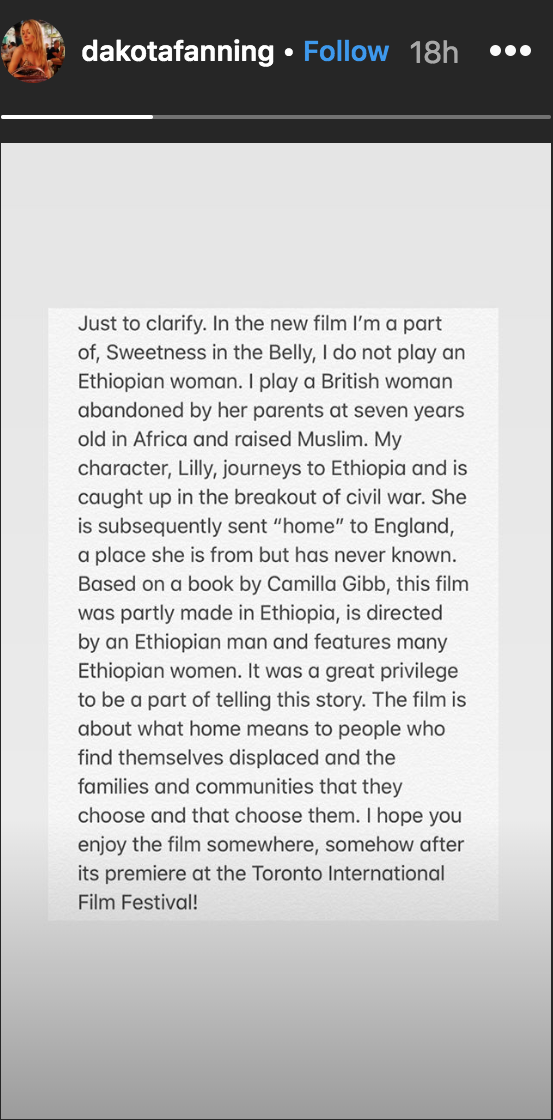Dakota Fanning’s Defense of Her Role in a Film About Ethiopia Misses the Mark
Credit to Author: Bettina Makalintal| Date: Thu, 05 Sep 2019 20:22:11 +0000
Yesterday, Deadline posted the first look at Dakota Fanning’s new movie, Sweetness In the Belly, a “refugee drama-romance” that’s set to premiere at this week’s Toronto International Film Festival. In it, Deadline originally claimed, Fanning played a “white Ethiopian muslim” who has a “passionate lost love affair” with an Ethiopian doctor. The response to the movie and Fanning’s role in it was basically one big YIKES.
The digs on Fanning came swiftly. Comedian Laurie Kilmartin tweeted, “Did she steal this role from Scarlett Johansen [sic]?” Writer Zito Madu added, “This is so unnecessary. It’s not like it’s hard to find black muslim actresses for a role like this. Scarlett Johansson is right there.” As with Johansson’s notable controversies, the pushback to Sweetness In the Belly came from perceptions of whitewashing.

Fanning took to Instagram yesterday to clarify her role in the movie, which Deadline had misstated. “In the new film I’m a part of, Sweetness In the Belly, I do not play an Ethiopian woman. I play a British woman abandoned by her parents at seven years old in Africa and raised Muslim,” the actress wrote. “Based on a book by Camilla Gibb, this film was partly made in Ethiopia, is directed by an Ethiopian man and features many Ethiopian women.” (Deadline has since updated its headline to reflect Fanning’s role as a “Brit raised Muslim in Africa.”)
As Fanning mentions, Camilla Gibb’s 2006 book follows a British-born, white Muslim woman who has been raised in a Sufi shrine, after having been left in Africa by her hippie parents. Per a review in the Guardian at the book’s release, “Lily, the white outsider, the devout Muslim, the foreigner who sticks out like a sore thumb, immerses herself in the superstitious, conformist community she has joined and begins to find acceptance.”
The reactions to the movie were obviously premature and based on information that wasn’t accurate, and it’s clear that Fanning was trying to smooth over the controversy through her Instagram statement. “It was a great privilege to be a part of telling this story,” she added. Despite all of that, the critiques of Sweetness In the Belly are still relevant.
Earlier this week, USC’s Annenberg Inclusion Initiative released a study that 2018 was a 12-year high point for the number of Black and Asian characters in speaking roles, but that Hollywood still falls short when it comes to including women from diverse backgrounds. “These numbers reveal the depth of the erasure of female characters, particularly those from underrepresented racial/ethnic backgrounds, the LGBTQ community and individuals with disabilities,” AII program director Marc Choueiti said in a statement, per the Hollywood Reporter.
Therein lies the problem with the premise of Sweetness In the Belly. Making a movie about Ethiopia that still centers on a white female lead just seems dense given the lack of women of color in Hollywood’s narratives. Instead of creating a story around actual Africans, Sweetness In the Belly‘s premise proves yet again Hollywood’s tendency to go above and beyond in order to center white actors. Notably, two years ago, the plot of the live-action Ghost in the Shell remake was altered in a way that was clearly meant to justify Scarlett Johansson’s casting as a Japanese woman.
“How do they always make stories about brown and black people wrapped up in the candy of the central protagonist who’s white?” wrote one commenter on Deadline’s piece. “If we wrote a satire on how Hollywood treats African stories, it would result in this film. But. Not. Satire.”
Real-life narratives along the lines of Sweetness In the Belly‘s cross-cultural tale of finding home and community surely exist, and plenty of white Muslims may in fact live in Ethiopia. But the movie frames a story of people in Africa—people whose presence isn’t terribly common in Hollywood—as relevant only with a white female lead. Despite Fanning’s acknowledgment of the movie’s “many Ethiopian women,” it must still be sold with Fanning as its leading face. The movie presents a high-profile opportunity for Ethiopian director Zeresenay Mehari, but it poses the question of the trade-offs creatives of color must weigh in order to break into Hollywood’s mainstream.
This article originally appeared on VICE US.